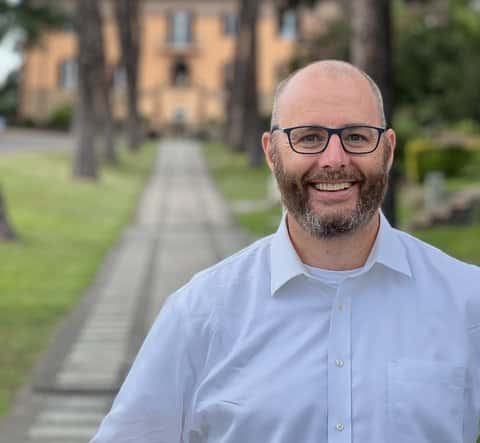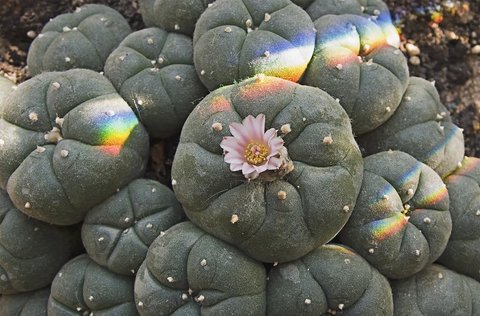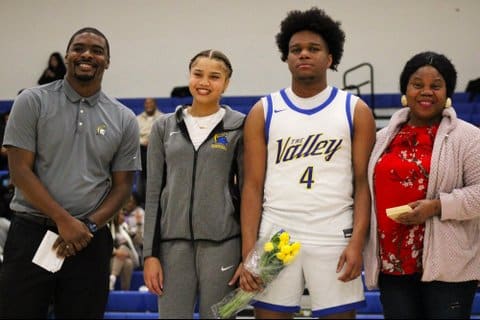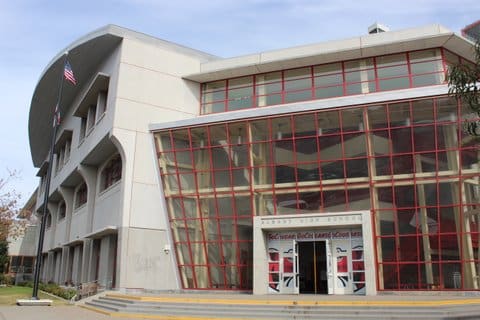
27 Jan His Lessons About Mass Incarceration Changed My Life

The author took his social justice class as a high school junior at Saint Mary’s in Berkeley. (Courtesy of Joe Palladino)
Commentary, Natasha Kaye
When I first began high school, there wasn’t much more on my mind than Netflix, my odd little hobbies and boys. I was, as ashamed as I am to admit, totally clueless about what was happening in the world outside of my interests. That is, until I signed up, on a whim, to take Mr. Palladino’s social justice class during my junior year of high school at Saint Mary’s in Berkeley.
I had heard only good things about him: He was an easy grader and a super chill teacher among our otherwise rigid Catholic school faculty. I was stoked. It took virtually no time at all for me to become a teacher’s pet, a formerly foreign role to me as I had never much taken to teachers. But I found him and his lessons so captivating that after the first two weeks, I had scooched my chair to the front of the classroom, where I remained for the rest of the year.
We explored hard-hitting and prevalent topics such as the ethics of artificial intelligence, illegal immigration to the United States, the Syrian refugee crisis and the Arab Spring, and the one that would alter the trajectory of my life: mass incarceration in America.
Mr. Palladino, whom we lovingly called “Pally,” spent three weeks teaching us about the systematic incarceration of Black men and how it affects the community and nation as a whole. He went where our history teachers didn’t. He taught us how a legacy of slavery was showcased in legislation and enforcement throughout the nation’s history and that it never really left.
Growing up in a mixed-race household in the Bay Area, I had always heard about racism and police, but I had never taken the time to understand it. I remember when Oscar Grant was killed, and the Black Lives Matter protests of 2016, and even when my neighbor’s grandson Pedie Perez was killed by Richmond Police at Uncle Sam’s Liquor store in 2014.
I was aware police brutality surrounded me, but as someone who has always been told to go to the police if anything was wrong, I suddenly had a different take. Maybe I should question our systems of enforcement and policy; perhaps my parents couldn’t teach me everything, and maybe it was time to start doing my own research.
What I valued most about Pally was that he didn’t tell us what to think; instead, he showed us evidence and guided us to our own conclusions. If someone disagreed or was confused by something, he homed in on it and challenged the class to sit with our discomfort.
Nothing was taboo in Pally’s class, and in Catholic school, traditionally, very much is taboo in the classroom. I pestered Pally with questions during class and well after, ultimately resulting in a genuine teacher-student friendship. Pally saw how interested I was in these topics, namely mass incarceration, and encouraged me to sign up for his club, the Peace and Justice club, where they explored these topics in greater depth. It seemed like a no-brainer, so I started attending meetings, eventually traveled to New Orleans for a weeklong assembly on incarceration in the U.S. and organized workshops on the topic for our student body during assemblies the following year. For the first time, I was leading workshops, speaking before hundreds of my peers, and involved in something I was passionate about, and something that affected my community firsthand.
>>>Read: In Appreciation of the Teacher Who Helped Me Find Myself
I found a love in researching and relaying information to others, and by my senior year, I dipped my toe into journalism officially through researching and reporting our daily news segments on the morning announcements. By the end of senior year, all plans I had to pursue a career in forensic science had flown out the window, and journalism seemed like the clear path to follow. Pally even laughed when I asked him if he could see me working in a morgue for the rest of my life. “Not unless there’s someone alive for you to bother all day,” he joked.
I truly have Pally to thank for encouraging me to utilize my unrelenting curiosity to become an aware citizen and passionate journalist. It’s because of him that I am where I am, and I am who I am, and for that, I couldn’t be more grateful. Thank you for everything, Pally.





No Comments